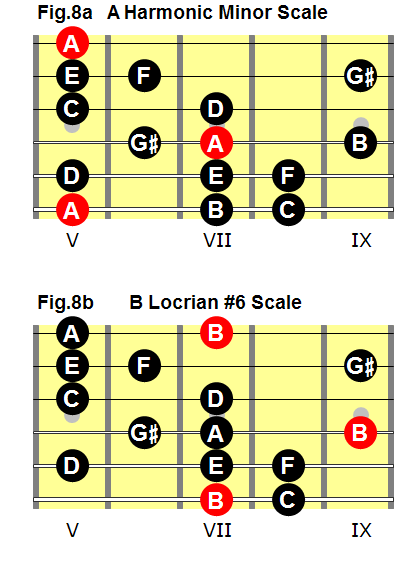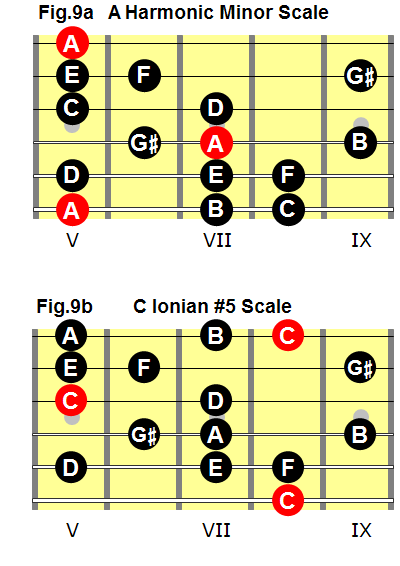This post will use the relative approach to construct the modes of the harmonic minor scale and provide instruction on how to play them on a guitar in any key.
Modes: The Relative Approach
With the relative approach to modes, each mode is viewed as a type of scale that is derived from the harmonic minor scale and related to that scale.
Modes of the Harmonic Minor Scale
Harmonic Minor Scale (HM1)
The first mode of the harmonic minor scale (HM1) is identical to the harmonic minor scale; it has no special name.
If we start any given harmonic minor scale on its root note and play to that same note an octave higher, we are playing a harmonic minor scale.
If we start an A harmonic minor scale on an A and play to the A an octave higher, we are playing an A harmonic minor scale (HM1), fig.1.
Fig.1

Locrian #6 (HM2)
The Locrian #6 mode is the second mode of the harmonic minor scale.
If we start any given harmonic minor scale on its second note and play to that same note an octave higher, we are playing a Locrian #6 scale.
If we start an A harmonic minor scale on a B and play to the B an octave higher, we are playing a B Locrian #6 scale (fig.2).
A B Locrian #6 scale contains the same notes as an A harmonic minor scale, but played from B to B.
The root note is B.
Fig.2

Ionian #5 (HM3)
The Ionian #5 mode is the third mode of the harmonic minor scale.
If we start any given harmonic minor scale on its third note and play to that same note an octave higher, we are playing an Ionian #5 scale.
If we start an A harmonic minor scale on a C and play to the C an octave higher, we are playing a C Ionian #5 scale (fig.3).
A C Ionian #5 scale contains the same notes as an A harmonic minor scale, but played from C to C.
The root note is C.
Fig.3

Dorian #4 (HM4)
The Dorian #4 mode is the fourth mode of the harmonic minor scale.
If we start any given harmonic minor scale on its fourth note and play to that same note an octave higher, we are playing a Dorian #4 scale.
If we start an A harmonic minor scale on a D and play to the D an octave higher, we are playing a D Dorian #4 scale (fig.4).
A D Dorian #4 scale contains the same notes as an A harmonic minor scale, but played from D to D.
The root note is D.
Fig.4

Phrygian #3 (or Phrygian Dominant) Mode (HM5)
The Phrygian dominant mode is the fifth mode of the harmonic minor scale.
If we start any given harmonic minor scale on its fifth note and play to that same note an octave higher, we are playing a Phrygian dominant scale.
If we start an A harmonic minor scale on an E and play to the E an octave higher, we are playing an E Phrygian dominant scale (fig.5).
An E Phrygian dominant scale contains the same notes as an A harmonic minor scale, but played from E to E.
The root note is E.
Fig.5

Lydian #2 Mode
The Lydian #2 mode is the sixth mode of the harmonic minor scale.
If we start any given harmonic minor scale on its sixth note and play to that same note an octave higher, we are playing a Lydian #2 scale.
If we start an A harmonic minor scale on F and play to the F an octave higher, we are playing an F Lydian #2 scale (fig.6).
An F Lydian #2 scale contains the same notes as an A harmonic minor scale, but played from F to F.
The root note is F.
Fig.6

Super Locrian bb7 (HM7) Scale
The super Locrian bb7 (diminished) mode is the seventh mode of the harmonic minor scale.
If we start any given harmonic minor scale on its seventh note and play to that same note an octave higher, we are playing a super Locrian bb7 scale.
If we start an A harmonic minor scale on a G# and play to the G# an octave higher, we are playing a G# super Locrian scale (fig.7).
A G# super Locrian bb7scale contains the same notes as an A harmonic minor scale, but played from G# to G#.
The root note is G#.
Fig.7

Modes of the Harmonic Minor Scale on a Guitar
With the relative approach to modes, each of the modes is related to the harmonic minor scale from which it is derived.
Using this approach, you don’t need to learn any new scale fingerings to play the modes, just play the related harmonic minor scale fingering but start and end on a different note.
Locrian #6 Mode
To play a B Locrian #6 scale on a guitar, play an A harmonic minor scale from B to B (fig.8).
Fig.8

Ionian #5 Mode
To play a C Ionian #5 scale on a guitar, play an A harmonic minor scale from C to C (fig.9).
Fig.9

Dorian #4 Mode
To play a D Dorian #4 scale on a guitar, play an A harmonic minor scale from D to D (fig.10).
Fig.10

Phrygian #3 (or Phrygian Dominant) Mode
To play an E Phrygian dominant scale on a guitar, play an A harmonic minor scale from E to E (fig.11).
Fig.11

Lydian #2 Mode
To play an F Lydian #2 scale on a guitar, play an A harmonic minor scale from F to F (fig.12).
Fig.12

Super Locrian bb7 Mode
To play a G# super Locrian bb7 scale on a guitar, play an A harmonic minor scale from G# to G# (fig.13).
Fig.13

